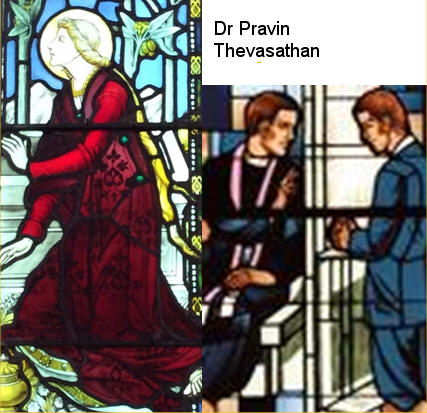Catholic Medical Quarterly Volume 71(4) November 2021
Confession and Mental Health
 "When
speaking of the priest's contribution to mental health, one's thoughts
turn first to his function as confessor. Now, confession in the Catholic
sense has a therapeutic value all its own, but it cannot be compared with
any other therapeutic device since confession is a sacrament and
therefore belongs to the supernatural order. Those who look upon
sacramental confession as just another psychotherapeutic device miss its
meaning completely...although confession belongs to the supernatural
order, it has psychotherapeutic after-effects, for it not only rids the
penitent of his sins but greatly contributes in most cases to his feelings
of security by ridding him of his feelings of guilt." [1]
"When
speaking of the priest's contribution to mental health, one's thoughts
turn first to his function as confessor. Now, confession in the Catholic
sense has a therapeutic value all its own, but it cannot be compared with
any other therapeutic device since confession is a sacrament and
therefore belongs to the supernatural order. Those who look upon
sacramental confession as just another psychotherapeutic device miss its
meaning completely...although confession belongs to the supernatural
order, it has psychotherapeutic after-effects, for it not only rids the
penitent of his sins but greatly contributes in most cases to his feelings
of security by ridding him of his feelings of guilt." [1]
The above quote is a neat summary of what follows. In his excellent booklet Confession: A Source Of Enduring Grace, Father J de Mallmann writes about a doctor who tells a priest: “Sometimes I wonder whether instead of my white coat, I ought to don a cassock. ...I can give advice but no absolution.”[2]
Of course, the doctor is exaggerating. There are certainly those who need mental health specialists. But he does have a point: in the old days when psychiatrists had the time to listen for prolonged periods to their patients, it sometimes did feel like confession without absolution. Those of us who are critical of the old psychiatry will admit that attempts were made to treat the whole person. Much of psychiatry these days seems to be symptoms-based.
But confession cannot be reduced to psychology because it belongs to the supernatural order. In his booklet on confession, Father Hugh Thwaites puts it so well: " The human soul has the capacity for God much as an electric light bulb has capacity for electricity, and when a man is baptised, the Holy Trinity enters his soul, and at once he starts living with a new life. Just as when you turn the light on the darkness goes, so when God enters the soul all sin goes, all sin is forgiven...He is incorporated into Christ, and he starts living a supernatural life, which is nothing more or less than a sharing in the life of Jesus." Father Thwaites goes on to say that we have been given not only baptism, but confession as well because we are chronic sinners in need of God's mercy. He notes the many fruits of the sacrament. It obtains for us a greater delicacy of conscience. We receive the "grace of a greater supernatural hatred for sin." And it gives us a greater awareness of God's love for us.
Father Mallmann observes that we often have a negative view of confession when we only think of it in terms of cleansing our souls. We forget that a sacrament is essentially a source of life: "If St Francis de Sales and St Vincent de Paul confessed daily, it is because they possessed an essentially positive view of the sacrament. For them, confession was like another form of Communion to which they sought fruitful recourse in order to be ever more alive."
Confession is thus an encounter with the Lord.
 Father
Mallmann discusses the fruits of confession according to the teachings of
Pope Pius XII. Firstly, it increases true self-knowledge. The more
specific the confession, the more firm will be the resolution. Secondly,
it encourages humility: "Since each of my failings spring, without a
shadow of a doubt, from an upsurge of pride which prefers my will to the
will of God, is it not natural that my pride be curtailed principally by
the humiliation that comes with true confession of my sin?" Thirdly,
confession lends itself to the uprooting of bad habits. Fourthly, we will
combat spiritual negligence and lukewarmness: "My love for Jesus will be
renewed, and having rediscovered the fear of sin, the Passion and the
Cross will once more take on their true dimensions and I will be
astonished by the bounty, patience and mercy of God." Fifthly, confession
purifies our conscience. The more we confess, the less likely are we to be
deceived about the state of our souls. Sixthly, confession strengthens the
will. Seventhly, it lends itself to spiritual direction. St Bernard said:
"He who would be a teacher to himself is student to a fool!" Finally,
confession increases grace.
Father
Mallmann discusses the fruits of confession according to the teachings of
Pope Pius XII. Firstly, it increases true self-knowledge. The more
specific the confession, the more firm will be the resolution. Secondly,
it encourages humility: "Since each of my failings spring, without a
shadow of a doubt, from an upsurge of pride which prefers my will to the
will of God, is it not natural that my pride be curtailed principally by
the humiliation that comes with true confession of my sin?" Thirdly,
confession lends itself to the uprooting of bad habits. Fourthly, we will
combat spiritual negligence and lukewarmness: "My love for Jesus will be
renewed, and having rediscovered the fear of sin, the Passion and the
Cross will once more take on their true dimensions and I will be
astonished by the bounty, patience and mercy of God." Fifthly, confession
purifies our conscience. The more we confess, the less likely are we to be
deceived about the state of our souls. Sixthly, confession strengthens the
will. Seventhly, it lends itself to spiritual direction. St Bernard said:
"He who would be a teacher to himself is student to a fool!" Finally,
confession increases grace.
Father Thwaites notes three qualities of a good confession. First of all, exactness. We should distinguish between what is sinful and what is just an imperfection. We are there to confess our sins, not those of others. Secondly, tranquility : "Too much anxiety can diminish our confidence in God's love for us, so we should have great peace in this sacrament. The third quality is energy, and this refers to our purpose of amendment, in our desire to correct our faults.
I will end this reflection with these beautiful words of Father Thwaites: "In conclusion, we must try to have a great love of this sacrament. When Jesus came back from the dead, He could hardly wait to give (this sacrament) to us. He had hardly got into the upper room before He was saying: Receive the Holy Spirit, whose sins you forgive, they will be forgiven. That is what He came into the world for, to forgive us our sins..."
References
- J. H Vander Veldt and R Odenwald, Psychiatry and Catholicism (McGraw-Hill, 1952)
- J. de Mallmann Un Resourcement Permanent La Confession (H. BOSCQ, 1988)
- Fr. Hugh Thwaites, S.J. Confession (Augustine Publishing Co, 1985)
